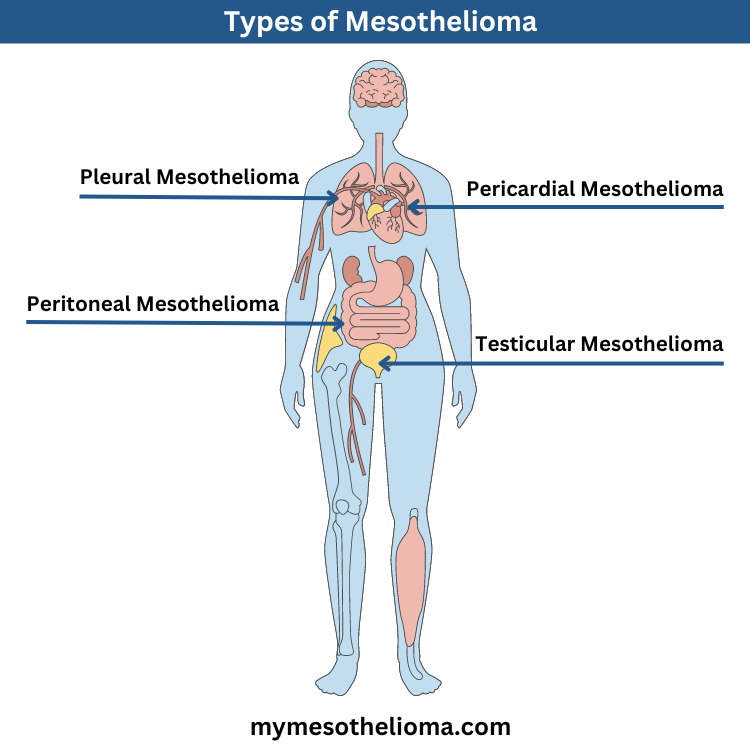Mesothelioma is a rare type of cancer that is known to be caused by exposure to asbestos. Asbestos is a naturally occurring group of six minerals that, when inhaled or ingested, can become lodged in the internal tissues and cause irritation and scarring that eventually leads to cancer. There are four types of mesothelioma, as well as three main types of mesothelioma cells. Learning about each type is important, as different types have different prognoses and treatment options.
Mesothelioma Cell Types
The three main types of mesothelioma cancer cells are epithelial, sarcomatoid and biphasic. Differentiating between these cell types requires looking at a tissue biopsy under a microscope.
Epithelial or epithelioid cells are the most common cell type found in mesothelioma patients, as well as the most responsive to treatment. According to 2020 data from Translational Lung Cancer Research, approximately 80 percent of all cases of malignant mesothelioma contain epithelial cells.
Sarcomatoid mesothelioma cells are the least common cell type, making up around 5 to 10 percent of diagnoses. They are also the most aggressive and difficult to treat. Biphasic mesothelioma cells are a mixture of both epithelial and sarcomatoid cells. Around 10 to 15 percent of mesothelioma tumors contain biphasic cells. The patient’s prognosis, life expectancy and treatment options depend on which type of cell is most prevalent in the patient.

Pleural Mesothelioma
Mesothelioma is also diagnosed according to tumor location. There are four types of mesothelioma under this classification system: pleural, peritoneal, pericardial and testicular. Pleural mesothelioma is the most common type. According to the Centers for Disease Control and Prevention, from 1999 to 2018, 82.1 percent of mesothelioma diagnoses were pleural mesothelioma.
Pleural mesothelioma is located in the pleura, or the thin membrane lining the outside of the lungs. This is why mesothelioma is often associated with trouble breathing, a persistent cough and other respiratory problems. Pleural mesothelioma is most often caused by inhaling asbestos fibers into the lungs.
Symptoms
- Dry cough
- Cough that worsens over time
- Difficulty breathing
- Shortness of breath
- Wheezing
- Chest pain or tightness
- Lumps beneath the skin on the chest
- Weight loss
- Fever
- Fatigue
Treatment
Pleural mesothelioma can potentially be treated with surgery, chemotherapy and radiation therapy, depending on the stage of the cancer at the time of diagnosis. These treatments are noncurative since malignant mesothelioma is a terminal type of cancer. However, they may be able to help improve a patient’s life expectancy and quality of life.
Prognosis
The prognosis for a patient who is diagnosed with pleural mesothelioma is a life expectancy of about one year, on average, according to the latest data from the National Library of Medicine. With treatment, some patients may survive for 15 to 18 months. However, based on the patient’s health history and response to treatments, life expectancy can be extended by months or even years. Some patients with pleural mesothelioma have been known to live for 10 or more years after the date of diagnosis.
Peritoneal Mesothelioma
Peritoneal mesothelioma refers to tumors or cancer cells in the lining or cavity of the abdomen, known as the peritoneum. This type of cancer can be caused by ingesting asbestos fibers, such as swallowing fibers that are too small to see. It is the second most common type of mesothelioma, diagnosed in 9.9 percent of cases from1999 to 2018.
Symptoms
- Abdominal pain
- Abdominal swelling or distention
- Bloating
- Bowel obstruction or impaction
- Altered bowel movements
- Constipation or diarrhea
- Fluid in the abdomen (peritoneal effusion)
- Nausea or loss of appetite
- Fever or night sweats
- Unexplained or sudden weight loss
Treatment
Treating peritoneal mesothelioma often involves surgery and heated chemotherapy. This is a two-step process known as HIPEC, or hyperthermic intraperitoneal chemotherapy. The first step is to surgically remove cancerous tumors. Then, heated chemotherapy drugs are applied to the inside of the abdomen to eliminate remaining cancerous cells.
Prognosis
While there is less research and information about peritoneal mesothelioma compared to pleural, it generally has a better prognosis (source: PubMed Central). This study found that the median overall survival rate of patients with peritoneal mesothelioma is 31 months. With surgical and chemotherapy treatments, survival rate can improve by about 23 months.

Pericardial Mesothelioma
Pericardial mesothelioma is cancer of the protective sac surrounding the heart, or the pericardium. It is a rare variant of malignant mesothelioma, accounting for only 0.2 percent of all mesothelioma diagnoses from 1999 to 2018. There are only approximately 200 documented cases of pericardial mesothelioma in medical literature, according to a case report published by the Pan African Medical Journal in 2020.
Symptoms
- Irregular heartbeat (arrhythmia)
- Rapid heartbeat
- Heart palpitations
- Chest pain
- Fluid buildup in the pericardium
- Shortness of breath
- Persistent cough
Treatment
Most treatment options for pericardial mesothelioma are palliative, meaning they are meant to improve the patient’s comfort and quality of life rather than to treat the cancer. However, some patients may be eligible for surgery that can improve life expectancy.
Prognosis
The prognosis for patients diagnosed with pericardial mesothelioma is an average of two to six months, according to data published in 2021 by Cureus. Of the cases documented, life expectancies have ranged from about six weeks to 15 months.
Testicular Mesothelioma
The fourth type of mesothelioma is testicular. This means the malignant tumor is located on the tunica vaginalis, or the outer lining of the testes. This is the rarest and least-documented type of mesothelioma, known to have occurred in less than 300 cases in medical literature to date (source: PubMed Central).
Symptoms
- Swelling of the testicles or scrotum
- Scrotal swelling due to fluid buildup
- Testicular pain
- Painless testicular lumps or masses
Treatment
The treatments available for testicular mesothelioma typically include surgery – for eligible patients – followed by radiation therapy and chemotherapy to kill as many remaining cancer cells as possible.
Prognosis
Based on the limited data available, the average prognosis for a patient who is diagnosed with testicular mesothelioma is a survival rate of 1.7 years (source: the National Library of Medicine). With surgery, however, this may be lengthened. Testicular mesothelioma has a high rate of recurrence. About 93 percent of patients with documented cases of this type of cancer experienced recurrence within five years of their initial diagnoses (source: PubMed Central).

Diagnosed With Mesothelioma? You Are Not Alone
If you or a loved one has been diagnosed with any type of mesothelioma, help is available. You can search for mesothelioma support groups in your area or ask your doctor for resources to help you cope with your diagnosis. Your oncologist and care team will create a custom treatment plan based on your unique diagnosis, the stage of the cancer, your age and overall health, and other factors.
Then, you can explore the option of collecting financial compensation for your mesothelioma diagnosis by consulting with an attorney near you. You may be entitled to a financial recovery if one or more parties should have prevented your harmful exposure to asbestos. For more information about pursuing justice for mesothelioma, contact an asbestos attorney at Bailey & Glasser, LLP.

